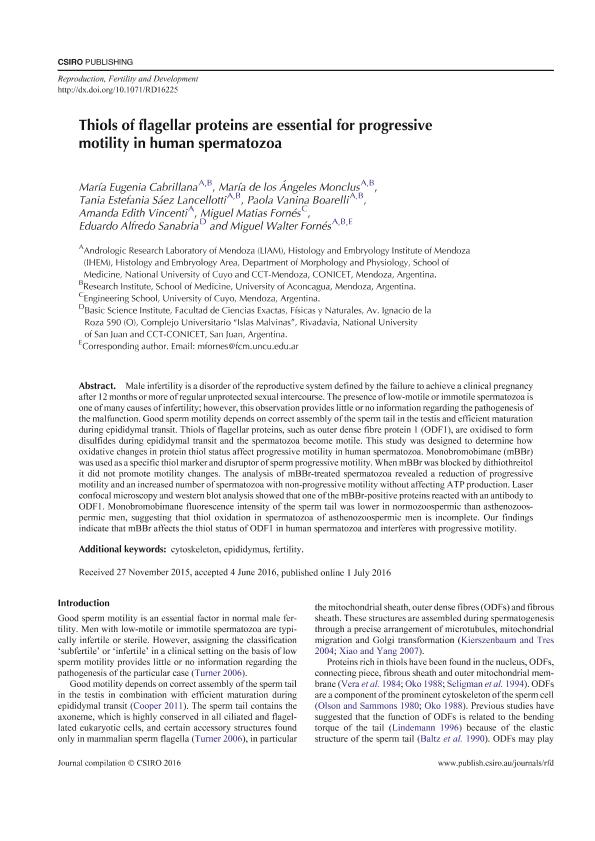Artículo
Thiols of flagellar proteins are essential for progressive motility in human spermatozoa
Cabrillana, María Eugenia ; Monclus, Maria de Los Angeles
; Monclus, Maria de Los Angeles ; Saez Lancellotti, Tania Emilce Estefania
; Saez Lancellotti, Tania Emilce Estefania ; Boarelli, Paola Vanina
; Boarelli, Paola Vanina ; Vincenti, Amanda Edith
; Vincenti, Amanda Edith ; Fornes, Miguel Matías; Sanabria, Eduardo Alfredo
; Fornes, Miguel Matías; Sanabria, Eduardo Alfredo ; Fornes, Miguel Walter
; Fornes, Miguel Walter
 ; Monclus, Maria de Los Angeles
; Monclus, Maria de Los Angeles ; Saez Lancellotti, Tania Emilce Estefania
; Saez Lancellotti, Tania Emilce Estefania ; Boarelli, Paola Vanina
; Boarelli, Paola Vanina ; Vincenti, Amanda Edith
; Vincenti, Amanda Edith ; Fornes, Miguel Matías; Sanabria, Eduardo Alfredo
; Fornes, Miguel Matías; Sanabria, Eduardo Alfredo ; Fornes, Miguel Walter
; Fornes, Miguel Walter
Fecha de publicación:
01/07/2016
Editorial:
Csiro Publishing
Revista:
Reproduction Fertility and Development
ISSN:
1031-3613
Idioma:
Inglés
Tipo de recurso:
Artículo publicado
Clasificación temática:
Resumen
Male infertility is a disorder of the reproductive system defined by the failure to achieve a clinical pregnancy after 12 months or more of regular unprotected sexual intercourse. The presence of low-motile or immotile spermatozoa is one of many causes of infertility; however, this observation provides little or no information regarding the pathogenesis of the malfunction. Good sperm motility depends on correct assembly of the sperm tail in the testis and efficient maturation during epididymal transit. Thiols of flagellar proteins, such as outer dense fibre protein 1 (ODF1), are oxidised to form disulfides during epididymal transit and the spermatozoa become motile. This study was designed to determine how oxidative changes in protein thiol status affect progressive motility in human spermatozoa. Monobromobimane (mBBr) was used as a specific thiol marker and disruptor of sperm progressive motility. When mBBr was blocked by dithiothreitol it did not promote motility changes. The analysis of mBBr-treated spermatozoa revealed a reduction of progressive motility and an increased number of spermatozoa with non-progressive motility without affecting ATP production. Laser confocal microscopy and western blot analysis showed that one of the mBBr-positive proteins reacted with an antibody to ODF1. Monobromobimane fluorescence intensity of the sperm tail was lower in normozoospermic than asthenozoospermic men, suggesting that thiol oxidation in spermatozoa of asthenozoospermic men is incomplete. Our findings indicate that mBBr affects the thiol status of ODF1 in human spermatozoa and interferes with progressive motility.
Palabras clave:
Cytoskeleton
,
Epididymus
,
Fertility
Archivos asociados
Licencia
Identificadores
Colecciones
Articulos(CCT - SAN JUAN)
Articulos de CENTRO CIENTIFICO TECNOLOGICO CONICET - SAN JUAN
Articulos de CENTRO CIENTIFICO TECNOLOGICO CONICET - SAN JUAN
Articulos(IHEM)
Articulos de INST. HISTOLOGIA Y EMBRIOLOGIA DE MEND DR.M.BURGOS
Articulos de INST. HISTOLOGIA Y EMBRIOLOGIA DE MEND DR.M.BURGOS
Citación
Cabrillana, María Eugenia; Monclus, Maria de Los Angeles; Saez Lancellotti, Tania Emilce Estefania; Boarelli, Paola Vanina; Vincenti, Amanda Edith; et al.; Thiols of flagellar proteins are essential for progressive motility in human spermatozoa; Csiro Publishing; Reproduction Fertility and Development; 29; 7; 1-7-2016; 1435-1446
Compartir
Altmétricas



